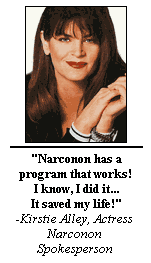
|
Navigate |
| Home |
| Drug Addiction |
| Drug Treatment |
| Drug Detox |
| Residential Treatment |
| Long Term Treatment |
| Drug Rehabilitation |
| Addiction Recovery |
|
News/Information/Articles |
|
Resources |

|
Drug
Addiction
On the flip side, many doctors
and psychiatrists are over prescribing narcotics to individuals; thus unintentionally
creating more drug addicts and fewer individuals who can handle their problems
without the aid of drugs. Currently, society has come to believe that all their
problems can be solved by a trip to their doctor, leaving with a prescription
in hand to "help" them deal with their problems. This theory of taking medication
to "help" solve problems seems quite backwards when you think about
it. Now the individual who needed help and guidance in finding a solution to
their problems are covering up their problems and emotions with prescription
medications. If this same individual had initially addressed their problem,
be it divorce, financial worries, family, school, etc., they could handle the
problem and move on with their life. Instead, many individuals feel that their
problems are too big to handle are dependent on their prescription drugs to
"help" them. Drug Addiction Follows
a Cycle like This: Everyone has experienced
this in life to a greater or lesser degree. The difference between an addict
and the non-addict is that the addict chooses drugs or alcohol as a solution
to the unwanted problem or discomfort. The Drug Addiction Progresses Alcohol and Drug Tolerance He now seeks drugs both
for the reward of the "pleasure" they give him, and also to avoid
the mental and physical horrors of withdrawal. Ironically, the addict's ability
to get "high" from the alcohol or drug gradually decreases as his
body adapts to the presence of foreign chemicals. He must take more and more,
not just to get an effect but often just to function at all. At this point,
the addict is stuck in a vicious dwindling spiral. The drugs he abuses have
changed him both physically and mentally. He has crossed an invisible and intangible
line. He is now a drug addict.
Why People Use Drugs
The first thing you must understand about drug addiction is that alcohol and addictive
drugs are basically painkillers. They chemically kill physical or emotional pain
and alter the mind's perception of reality. They make people numb. For drugs to
be attractive to a person there must first be some underlying unhappiness, sense
of hopelessness, or physical pain. In today's society, individuals are constantly
being bombarded with drugs; whether it is from illicit drug dealers or their local
doctor. Many think that it is "cool" and begin to use drugs
to "fit in" and become popular.
The life cycle of addiction begins with a problem, discomfort or some form of
emotional or physical pain a person is experiencing. They find this very difficult
to deal with. We start
off with an individual who, like most people in our society, is basically good.
This person encounters a problem or discomfort that they do not know how to
resolve or cannot confront. This could include problems such as difficulty "fitting
in" as a child or teenager, anxiety due to peer pressure or work expectations,
identity problems or divorce as an adult. It can also include physical discomfort,
such as an injury or chronic pain. The person experiencing the discomfort has
a real problem. He feels his present situation is unendurable, yet sees no good
solution to the problem.
Analogous to an adolescent child in his first love affair, the use of drugs
or alcohol becomes obsessive. The addicted person is trapped. Whatever problem
he was initially trying to solve by using drugs or alcohol fades from memory.
At this point, all he can think about is getting and using drugs. He loses the
ability to control his usage and disregards the horrible consequences of his
actions.
In addition to the mental stress created by his unethical behavior, the addict's
body has also adapted to the presence of the drugs. He will experience an overwhelming
obsession with getting and using his drugs, and will do anything to avoid the
pain of withdrawing from them. This is when the newly-created addict begins
to experience drug cravings.
 Drug Overdose as Internet Pals Watch
Drug Overdose as Internet Pals Watch

